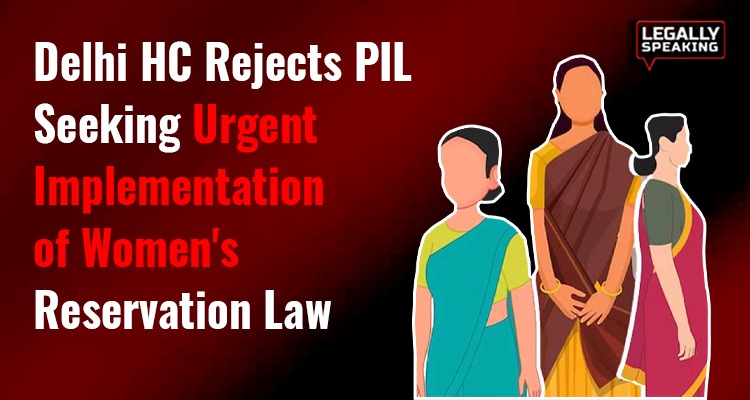
The Delhi High Court on Monday declined to entertain a Public Interest Litigation (PIL) filed by a lawyer, Yogamaya MG, seeking the urgent and time-bound implementation of the women’s reservation law.
The law aims to ensure a 33 per cent quota for women in the upcoming Lok Sabha elections next year.
A bench of Acting Chief Justice Manmohan and Justice Mini Pushkarna stated that the matter was already pending before the Supreme Court.
The bench emphasized that the enacted law itself provided a mechanism and procedure for its implementation.
Officially titled Nari Shakti Vandan Adhiniyam, the women’s reservation Act mandates the reservation of one-third of the seats in the Lok Sabha and all state assemblies for women.
The bill received presidential assent on September 29, making it a law. However, the law’s implementation is contingent upon a new census and subsequent delimitation to reserve seats for women.
During the hearing, Yogamaya MG, the petitioner’s counsel, argued that the PIL was in the interest of the “entire womanhood,” emphasizing the need for a resolution to ensure the Women’s Reservation Act’s implementation before the upcoming general elections.
The bench responded by highlighting the Supreme Court’s consideration of the matter in a petition filed by Jaya Thakur, stating that the two courts cannot simultaneously address the issue.
It further pointed out the procedural aspect in the Act, noting that it would come into force after delimitation, and advised the petitioner to challenge it accordingly.
Additional Solicitor General Chetan Sharma argued that the petition seemed to be more of a “publicity litigation” and reiterated that the process of introducing quotas for women in the legislature was already outlined in the Act.
Eventually, the petitioner withdrew the plea with the liberty to approach the Supreme Court.
Yogamaya MG had previously filed a writ petition, which was initially taken up by a single judge bench of the high court.
Later, she withdrew the petition with the liberty to file a PIL.
In her earlier petition, Yogamaya MG emphasized the crucial role of effective implementation of the reservation law in enhancing women’s representation and participation in Indian politics.
She expressed concerns about the delay in its application, stating that the lack of progress raised doubts about the authorities’ sincerity in implementing this significant legislative measure.
The Women’s Reservation Bill, 2023, received unanimous approval in the Rajya Sabha on September 21, aiming to reserve one-third of the seats in the Lok Sabha and state assemblies for women.
Congress leader Jaya Thakur has filed a petition before the Supreme Court, urging the immediate implementation of the 128th Constitution (Amendment) Bill ‘the Nari Shakti Vandan Adhiniyam’ before the next year’s general election.
Notably, the 33 per cent reservation for women will not apply to the Upper House of Parliament and state legislative councils.




